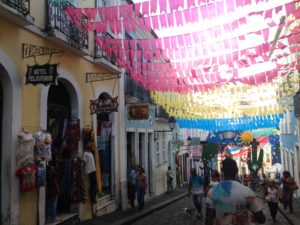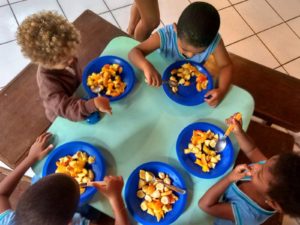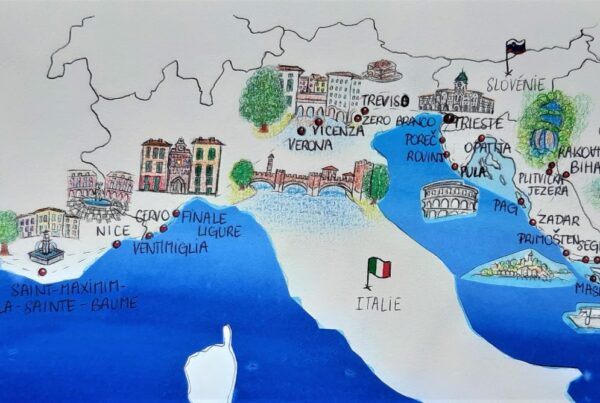Interview by Amandine Hess
This interview is part of The Sundial Press’ series on the experiences Sciences Po students have had during AIESEC projects. Second year student Laurine Poiret participated in an AIESEC exchange last year in Salvador de Bahia, Brazil.

Beautiful Salvador//Laurine Poiret
Can you describe the project you worked on?
I worked within a local daycare in an underprivileged part of the city, where I gave introductory English classes to the kids; the project is called X4Change and focuses on the idea that education can improve the world and offer new opportunities to lift children out of poverty and keep them off the streets.
Concretely, what did you do?
I spent every day at the daycare, where I took care of the kids, trying to find ways to incorporate learning the basics of English in their everyday life, through games, crafts, etc.

One day, we made a fruit salad with the kids to teach them how to say the different fruits and ustensils in English//Laurine Poiret
Did you prepare your project in advance or did you improvise/ learn on the field?
Not really – I had started coming up with ideas, but everything depends on the group of kids you meet when you get there; their age, their level, and most importantly their needs. One of the main things I learned with this project was flexibility; you have to adapt and respond to the specific needs and demands of the kids.
Who were you working with?
A group of about 10 volunteers, from Turkey, Ukraine, China, Italy, Russia, Mexico and Tunisia.
What are the main difficulties you faced?
Mainly the language barrier, as very few people spoke English, so I had to learn how to communicate in Portuguese very fast despite having never taken classes. The kids were also sometimes challenging, since they’re constantly trying to test your limits and it was made harder by the fact that at first, I didn’t speak Portuguese and they didn’t speak anything but.
What did this experience teach you?
So much!! But perseverance and adaptability, mostly.
What did you enjoy the most? The least?
The time with my host family, definitely. They didn’t speak English, so it was challenging for the first couple of weeks. But we found other ways to communicate and learned so much from one another, living together for six weeks. Those are people who just welcome you under their roof, feed you and take care of you for almost two months – they turn into your second family away from home. Definitely also all the volunteers that I shared my experience with; as in every AIESEC internship, you’re working with young people from all over the world, doing very different things and all coming together for a couple of weeks, trying to make a difference.
I definitely didn’t enjoy the lack of safety – but hey, I survived!
Did you have some free time as well?
Yes, I would go out most nights with other volunteers or Brazilians that I met there, and during the weekends we usually went away for a couple of days to visit the different regions of the country.

The sunset from the top of Pão de Açúcar, when we went to Rio de Janeiro for a couple of days//Laurine Poiret

Copacabana, Rio de Janeiro//Laurine Poiret
Are you still in contact with the people there?
Yes! I made friends for life there – I’m still talking to a lot of the volunteers I worked with and the Brazilian AIESECers who took care of me during the six weeks, some of them I’m planning to travel with this summer. And of course, my host family, who will always be a second family to me.
Any advice on how to make the most of this experience?
Know that you’re signing up for something that is going to be hard, and challenge most of your beliefs; you’re going to be in difficult situations sometimes, lost and without anyone to communicate with, but you have to persevere to get to the good parts. You have to be ready for it not to be all rainbows and puppies all the time.
Everyone has so much to teach you, so be open to hear it. Meet locals, bond with the local AIESECers, get to know the people who are working with you; you’ll make friendships for life and learn so much. And most importantly don’t make this experience about you; you’re going to learn much more than you’re going to teach.
Other posts that may interest you:
- The Trouble with ‘Ecocide’
- Carbon dioxide removal – hit or miss?
- Local Victories for Turkish Opposition — A Sign of Hope?
- Are France and Japan a Mismatch Made in Heaven?
- A Reflection on Dark Tourism
Discover more from The Sundial Press
Subscribe to get the latest posts sent to your email.




